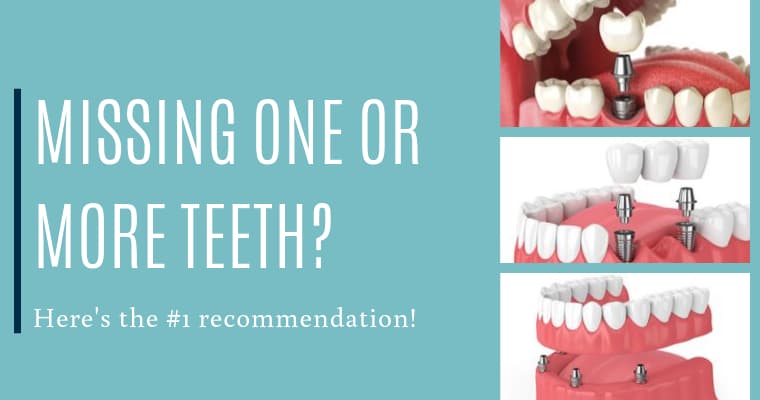The Buzz on Dental Sense
The Buzz on Dental Sense
Blog Article
The Greatest Guide To Dental Sense
Table of ContentsThe 25-Second Trick For Dental SenseDental Sense Can Be Fun For EveryoneDental Sense - The FactsAn Unbiased View of Dental Sense
are medical gadgets operatively implanted into the jaw to restore a person's capacity to eat or their appearance. They offer support for man-made (phony) teeth, such as crowns, bridges, or dentures. When a tooth is lost due to injury or disease, a person can experience problems such as quick bone loss, defective speech, or adjustments to chewing patterns that cause pain.Oral dental implant systems contain an oral implant body and dental implant abutment and may also consist of a joint fixation screw. Dental implants. The oral implant body is operatively placed in the jawbone instead of the tooth's origin. The dental implant abutment is generally connected to the dental implant body by the abutment addiction screw and expands with gums right into the mouth to support the affixed artificial teeth
(https://medium.com/@matthewmusic33101/about)Framework of The Dental Implant System choosing dental implants, talk to your dental provider about the possible advantages and risks, and whether you are a prospect for the procedure. Things to take into consideration: Your overall health and wellness is a vital consider figuring out whether you are a great candidate for dental implants, just how long it will take to recover, and how much time the dental implant may remain in location.
Smoking may impact the recovery procedure and reduce the long-term success of the implant. The healing process for the dental implant body might take several months or longer, during which time you normally have a short-lived abutment in place of the tooth. the oral implant procedure: Very carefully follow the dental health guidelines provided to you by your dental supplier.
The 15-Second Trick For Dental Sense
Implant failure can cause the requirement for another surgical treatment to repair or change the dental implant system. Restores the ability to chew Recovers cosmetic look Helps maintain the jawbone from diminishing because of bone loss Maintains the health and wellness of the bordering bone and gum tissues Assists maintain adjacent (close-by) teeth stable Enhances lifestyle Damage to surrounding all-natural teeth during implant positioning Injury to the surrounding cells throughout surgical procedure, such as sinus perforation Injury during surgery (for instance, crack of surrounding jawbone) Insufficient feature, such as feeling like the teeth do not bite with each other generally A sensation that the tooth hangs or turning in position arising from an abutment screw loosening Implant body failure (looseness of the implant body) as a result of systemic infection, which might be most likely in individuals with unrestrained diabetes mellitus as a result of neighborhood infection in bone and periodontals supporting the implant body as a result of delayed healing, which might be more probable in individuals that smoke Difficulty cleaning the gums around the dental implant, leading to poor dental health Untreated gum illness Post-surgical pins and needles as a result of nerve impingement or damages Always notify health treatment companies and imaging professionals that you have dental implants prior to any kind of magnetic resonance imaging (MRI) or x-ray procedures.
FDA is not mindful of any kind of unfavorable occasions reported for MRI or x-ray procedures with oral implants. Dental implants systems are commonly made from materials that follow worldwide agreement requirements of the International Organization for Standardization (ISO) or ASTM International. These requirements have details of what makes a secure material.

An oral implant is a framework that changes a missing out on tooth. With screw-like gadgets, the surgeon inserts an implant into the jawbone, and it acts as an anchor for an artificial tooth, called a crown.
The Greatest Guide To Dental Sense
Some people are not qualified for oral implant surgery. It is for dental cosmetic surgeons to operate on individuals with: intense illnessuncontrollable metabolic diseasebone or soft cells illness or infectionIf these problems web are settled, a person can have the surgical procedure. In, oral cosmetic surgeons abstain from operating people with: If people with any of the above undergo dental implant surgical treatment, there is a higher danger of the implant failing.

Oral implant surgical procedure is a customized process. Offer you time to heal. Connect the post and last crown, bridge or denture.
Next, your cosmetic surgeon will very carefully place the dental implant into your jaw. Lastly, your surgeon will rearrange your periodontals and close the cut with stitches. If your dental implant is near the front of your mouth, your dental professional will make a momentary tooth for you to use up until you recover. That way, you will not have a space in your smile while you recoup.
The Best Guide To Dental Sense
Your provider can tell you what to anticipate in your circumstance. Throughout the recovery phase, your jawbone needs to fuse to the oral implant. This procedure, called osseointegration, is essential for stability and lasting success. This process can take anywhere from three to 9 months. Sometimes, it might take much longer.
As soon as your implant heals, your dental practitioner can connect the joint (little port post) and your final restoration (crown, bridge or denture). This typically takes about one hour to finish and might need a second minor surgery. You shouldn't really feel any discomfort during your dental implant treatment because your service provider will certainly use medicine to numb your gum tissues.
Report this page